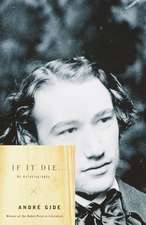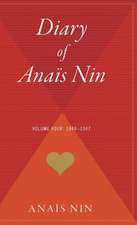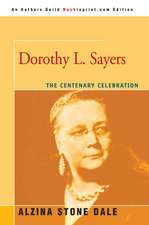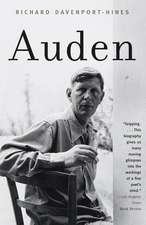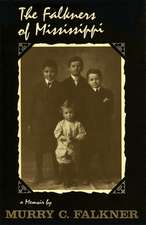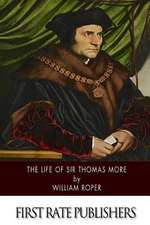Pushkin: A Biography
Autor T. J. Binyonen Limba Engleză Paperback – 31 oct 2004
Vezi toate premiile Carte premiată
L.A. Times Book Prize (2003)
In his magnificent, prizewinning Pushkin, T. J. Binyon lifts the veil of the iconic poet’s myth to reveal the complexity and pathos of his life while brilliantly evoking Russia in all its nineteenth-century splendor. Combining exemplary scholarship with the pace and detail of a great novel, Pushkin elevates biography to a work of art.
Preț: 158.87 lei
Nou
Puncte Express: 238
Preț estimativ în valută:
30.40€ • 31.91$ • 25.23£
30.40€ • 31.91$ • 25.23£
Carte disponibilă
Livrare economică 20 martie-03 aprilie
Preluare comenzi: 021 569.72.76
Specificații
ISBN-13: 9781400076529
ISBN-10: 1400076528
Pagini: 784
Ilustrații: 16 PP. B&W/76 TEXT ILLUS/1 MAP
Dimensiuni: 133 x 204 x 39 mm
Greutate: 0.71 kg
Editura: Vintage Publishing
ISBN-10: 1400076528
Pagini: 784
Ilustrații: 16 PP. B&W/76 TEXT ILLUS/1 MAP
Dimensiuni: 133 x 204 x 39 mm
Greutate: 0.71 kg
Editura: Vintage Publishing
Notă biografică
T. J. Binyon lectures on Russian literature at Oxford University and is a senior research fellow at Wadham College. He is also the author of Murder Will Out, a history of the fictional detective, and two thrillers, Swan Song and Greek Gifts. He lives with his wife in Oxfordshire, England.
Extras
Chapter 1
ANCESTRY AND CHILDHOOD
1799-1811
Lack of respect for one's ancestors is the first sign of barbarism and immorality.
VIII, 42
Aleksandr Pushkin was born in Moscow on Thursday 26 May 1799, in a "half-brick and half-wooden house" on a plot of land situated on the corner of Malaya Pochtovaya Street and Gospitalny Lane.This was in the eastern suburb known as the German Settlement, to which foreigners had been banished in 1652. Though distant from the centre, it was, up to the fire of 1812, a fashionable area, "the faubourg Saint-Germain of Moscow."On 8 June he was baptized in the parish church, the Church of the Epiphany on Elokhovskaya Square.* And that autumn his parents, Sergey and Nadezhda, took him and his sister Olga-born in December 1797-to visit their grandfather Osip Gannibal, Nadezhda's father, on his estate at Mikhailovskoe, in the Pskov region. Most of the next year was spent in St. Petersburg. The Emperor Paul, coming across Pushkin and his nurse, reprimanded the latter for not removing the baby's cap in the presence of royalty, and proceeded to do so himself. In the autumn they moved back to Moscow, where they were to remain for the duration of Pushkin's childhood.
Pushkin was proud of both sides of his ancestry: both of his father's family, the Pushkins, and of his mother's, the Gannibals. However, the two were so different from one another, antipodes in almost every respect, that to take equal pride in both required the reconciliation of contradictory values. In Pushkin the contradictions were never completely resolved, and the resulting tension would occasionally manifest itself, both in his behaviour and in his work. The most obvious difference lay in the origins of the two families: whereas the Pushkins could hardly have been more Russian, the Gannibals could hardly have been more exotic and more foreign.
On 15 November 1704 an official at the Foreign Office in Moscow passed on to General-Admiral Golovin, the minister, news of a Serbian trader who was employed by the department. "Before leaving Constantinople on 21 June," he wrote, "Master Savva Raguzinsky informed me that according to the order of your excellency he had acquired with great fear and danger to his life from the Turks two little blackamoors and a third for Ambassador Petr Andreevich [Tolstoy], and that he had sent these blackamoors with a man of his for safety by way of land through the Walachian territories." The boys had just arrived, the writer added; he had dispatched one to the ambassador's home, and the other two, who were brothers, to the Golovin palace. The younger of these was in the course of time to become General Abram Petrovich Gannibal, cavalier of the orders of St. Anne and Alexander Nevsky: Pushkin's maternal great-grandfather.*
Golovin had acquired the two boys as a gift for the tsar, to whom they were presented when he came to Moscow in December 1704. Peter had the elder brother baptized in the Preobrazhensky parish in Moscow, when he was given the name Aleksey, and the patronymic Petrov, from the tsar's own name. He was trained as a musician and attached to the Preobrazhensky regiment, where he played the hautboy in the regimental band. Unlike his younger brother Abram, he then vanishes from the pages of history.
Abram was from the beginning a favourite of the tsar. On 18 February 1705 the account-book of the royal household notes: "to Abram the negro for a coat and trimming were given 15 roubles 45 copecks."4 In the spring of 1707 Peter began a campaign against the Swedes. That autumn he celebrated a victory over Charles XII in the Orthodox Pyatnitskaya church in Vilna and simultaneously had his new protégé baptized, acting as his godfather and giving him, like his brother, the patronymic Petrov. And a document of 1709 notes that "by the tsar's order caftans have been made for Joachim the dwarf and Abram the blackamoor, for the Christmas festival, with camisoles and breeches."
In 1716 Peter made a second journey to Europe. Abram was one of his retinue, and was left in France together with three other young Russians to study fortification, sapping and mining at a military school. They returned to Russia in 1723, when Abram was commissioned as a lieutenant and posted to Riga. Peter died in February 1725, but his wife, Catherine, who succeeded him, continued his favours to Abram: he was employed to teach the tsar's grandson-the short-lived Peter II (1715-30; tsar 1727-30)-geometry and fortification. About this time he is first referred to as Gannibal. The acquisition of a surname was a step up the social ladder, differentiating him from the serfs and others known only by Christian name and patronymic; while that he should have called himself after the great Carthaginian general implies no lack of confidence in his own abilities.* His fortunes changed after Catherine's death: under a vague suspicion of political intrigue he was posted, first to Siberia, then to the Baltic coast. It was not until the accession of Elizabeth, Peter the Great's younger daughter, that his situation improved. In December 1741 she promoted him major-general from lieutenant-colonel, and appointed him military commander of Reval. The following year she made him a large grant of land in the province of Pskov: this included Mikhailovskoe, the estate where Pushkin was to spend two years in exile, from 1824 to 1826. In 1752 he was transferred to St. Petersburg, promoted general in 1759, and, in charge of military engineering throughout Russia, oversaw the building of the Ladoga canal and the fortification of Kronstadt. That a black slave, without relations, wealth or property, should have risen to this position is in the highest degree extraordinary: so remarkable, indeed, as to argue a character far beyond the common, one that was more than justified in appropriating the name and reputation of the great Carthaginian. Elizabeth's death in 1761 put an end to his career; he was retired without promotion or gratuity, and lived for the rest of his life in his country house at Suida, near St. Petersburg, where he died on 20 April 1781.
In 1731 he had married Evdokiya Dioper, the daughter of a Dutch sea captain. When she gave birth to a child, who was plainly not his, he divorced her (though bringing up the daughter as his own), and married the daughter of a Swedish officer in the Russian army, Christine von Schöberg. Of his seven children by Christine (three more died in infancy) the eldest son, Ivan, was a distinguished artillery officer who reached the rank of lieutenant-general. Petr, the second son, in old age lived in Pokrovskoe, some four kilometres from Mikhailovskoe, where he occupied himself with the distillation of home-made vodka. "He called for vodka," Pushkin wrote after visiting him there in 1817. "Vodka was brought. Pouring himself a glass, he ordered it to be offered to me, I did not pull a face-and by this seemed to gratify extraordinarily the old Negro. A quarter of an hour later he called for vodka again-and this happened again five or six times before dinner."6 He visited him again in 1825, when he was thinking of composing a biography of Abram, a project which later turned into the fictional Blackamoor of Peter the Great. "I am counting on seeing my old negro of a Great-Uncle who, I suppose, is going to die one of these fine days, and I must get from him some memoirs concerning my great-grandfather," he wrote on 11 August.7 He carried out the intention a week or so later, bringing back with him to Mikhailovskoe not only the manuscript of Abram's biography, written by his son-in-law, Adam Rotkirch, but also a short, unfinished note composed by Petr himself, outlining his and his father's careers.
Osip, Abram's third son and Pushkin's maternal grandfather, was a gunnery officer in the navy, reaching the rank of commander. Careless and dissolute, he ran up large debts, which his father in the end refused to pay and forbade him the house. At the beginning of the 1770s he was posted to Lipetsk, in the Tambov region, where he met and, in November 1773, married Mariya Pushkina.* Mariya was generally held to have thrown herself away; her Moscow cousins made up an epigram on the marriage:
There was once a great fool,
Who without Cupid's permission
Married a Vizapur.
The last line is a hit at Osip's complexion; it is a reference to the "swarthy Vizapur," Prince Poryus-Vizapursky, an Indian and a well-known eccentric.
Abram forgave the newly married Osip; he was allowed to return home, and his daughter Nadezhda, Pushkin's mother, was born in Suida on 21 June 1775. However, Osip found his father overbearing and family life excruciatingly boring. Leaving a note to say he would never return, he fled to Pskov, where he met a pretty young widow, Ustinya Tolstaya. Having received-so he said-a mysterious message announcing his wife's death, he married Ustinya in November 1778. Mariya, who was far from dead, lodged a complaint against him; after years of petitions and counter-petitions the marriage to Ustinya was annulled, and the estate of Kobrino outside St. Petersburg (which he had now inherited, together with Mikhailovskoe, from his father) made over in trust to Nadezhda. Osip retired in dudgeon to a lonely existence at Mikhailovskoe, where he died in 1806, leaving the estate encumbered with debt.
After the separation Mariya moved to St. Petersburg, spending the summers in Kobrino, some thirty miles from the capital. Nadezhda was therefore brought up in far from provincial surroundings. She was well read, spoke excellent French, and through Mariya's relations in the capital gained entrée into society, where she became known as "the beautiful creole."10 Here she met Sergey Pushkin; the couple-the poet's father and mother-were married on 28 September 1796 in the village church at Voskresenskoe on the Kobrino estate.
Though Pushkin claimed to be able to trace his ancestry on the paternal side back to the times of Alexander Nevsky,* the first to bear the family name was Konstantin Pushkin, born in the early fifteenth century, the younger son of a Grigory Pushka. There is a direct line of descent from him to the poet. From this time to the seventeenth century the Pushkins were a minor boyar family whose members never wielded great influence or occupied high positions in the state. They played, however, a lively part during the Time of Troubles (1584-1613), when one Gavrila Pushkin was a prominent supporter of the Pretender Dmitry. Pushkin put him into his historical drama Boris Godunov, remarking, "Finding in history one of my ancestors, who played an important role in that unhappy epoch, I brought him on the stage, without worrying about the delicacies of propriety, con amore, but without aristocratic conceit."11 But a decline in importance set in during the reign of Peter the Great. By the Table of Ranks, promulgated in 1722, an hierarchical system of rank, consisting of fourteen grades, was imposed on the military, civil and court services. Those in the first eight grades automatically became gentry: henceforth, therefore, social position was to be determined not by birth, but by rank. The more powerful aristocratic families were little affected, but the less important, such as the Pushkins, were submerged in the influx of the newly ennobled. During the eighteenth century no member of the family achieved distinction in any field, though family tradition erroneously maintained that Aleksey Fedorovich Pushkin, Mariya's father, had been voevoda (governor) of Tambov.
Lev Pushkin, the poet's paternal grandfather, served in the artillery, reaching the rank of major, before retiring in 1763. He settled in Moscow, in a large house on the Bozhedomka (now Delegatsky Street), in the northern suburbs. The grounds covered nearly fifteen acres, running down to an orangery and large fish-pond, formed by damming up the Neglinnaya River. By his first wife he had three children, and his second, Olga Vasilevna (née Chicherina), was to give him four more: Anna, Vasily, Sergey, and Elizaveta. As was the custom, Vasily and Sergey were entered for the army at a very early age: Vasily was seven and Sergey six when their names first appeared in the list. Actual service with the regiment-the Izmailovsky Life Guards-began much later: for Sergey at the end of the 1780s. He was promoted to ensign in 1794, to lieutenant in 1796, and in 1797 transferred to the chasseur battalion with the rank of captain-lieutenant. Both brothers left the army in the autumn of 1797. Neither was cut out for military service, but it is likely that their retirement was brought about by the changes introduced by the Emperor Paul, who had come to the throne the previous year. A military tyrant and pedant, he forced a tight Prus-sian uniform on the army; would arbitrarily consign officers to Siberia for a minor fault on parade; and repeatedly threatened to banish fashionable regiments such as the Izmailovsky from St. Petersburg to the provinces. The brothers, together with their young wives, both metropolitan beauties, all of whom adored the social whirl, would have viewed with horror the prospect of exile to some dull provincial backwater.
In 1834 Pushkin, looking back with nostalgia on the Moscow of his childhood, before the fire of 1812, wrote:
At one time there really was a rivalry between Moscow and Petersburg. Then in Moscow there were rich nobles who did not work, grandees who had given up the court, and independent, carefree individuals, passionately devoted to harmless slander and inexpensive hospitality; then Moscow was the gathering place for all Russia's aristocracy, which streamed to it in winter from every province. Brilliant young guardsmen flew thither from Petersburg. Every corner of the ancient capital was loud with music, there were crowds everywhere. Five thousand people filled the hall of the Noble Assembly twice a week. There the young met; marriages were made. Moscow was as famous for its brides as Vyazma for its gingerbread; Moscow dinners became a proverb. The innocent eccentricities of the Muscovites were a sign of their independence. They lived their own lives, amusing themselves as they liked, caring little for the opinion of others. One rich eccentric might build himself on one of the main streets a Chinese house with green dragons and with wooden mandarins under gilded parasols. Another might drive to Marina Roshcha in a carriage covered with pure silver plate. A third might mount five or so blackamoors, footmen and attendants on the rumble of a four-seat sleigh and drive it tandem along the summer street. Alamode belles appropriated Petersburg fashions, putting their indelible imprint on them. From afar haughty Petersburg mocked, but did not interfere with old mother Moscow's escapades. But where has this noisy, idle, carefree life gone? Where are the balls, the feasts, the eccentrics, the practical jokers? All have vanished.
He could have mentioned, too, the classically laid-out Yusupov garden, open to the "respectable public," with its alleys and round pond, marble statues and grotto, where he played as a child; the private theatres with troupes of serf actors; or the "magic castle," the Pashkov mansion on Mokhovaya Street, whose garden, full of exotic birds at large or in gilded cages, was known as "Eden": at night it was lit by lanterns, and a private orchestra played there on feast-days.
From the Hardcover edition.
ANCESTRY AND CHILDHOOD
1799-1811
Lack of respect for one's ancestors is the first sign of barbarism and immorality.
VIII, 42
Aleksandr Pushkin was born in Moscow on Thursday 26 May 1799, in a "half-brick and half-wooden house" on a plot of land situated on the corner of Malaya Pochtovaya Street and Gospitalny Lane.This was in the eastern suburb known as the German Settlement, to which foreigners had been banished in 1652. Though distant from the centre, it was, up to the fire of 1812, a fashionable area, "the faubourg Saint-Germain of Moscow."On 8 June he was baptized in the parish church, the Church of the Epiphany on Elokhovskaya Square.* And that autumn his parents, Sergey and Nadezhda, took him and his sister Olga-born in December 1797-to visit their grandfather Osip Gannibal, Nadezhda's father, on his estate at Mikhailovskoe, in the Pskov region. Most of the next year was spent in St. Petersburg. The Emperor Paul, coming across Pushkin and his nurse, reprimanded the latter for not removing the baby's cap in the presence of royalty, and proceeded to do so himself. In the autumn they moved back to Moscow, where they were to remain for the duration of Pushkin's childhood.
Pushkin was proud of both sides of his ancestry: both of his father's family, the Pushkins, and of his mother's, the Gannibals. However, the two were so different from one another, antipodes in almost every respect, that to take equal pride in both required the reconciliation of contradictory values. In Pushkin the contradictions were never completely resolved, and the resulting tension would occasionally manifest itself, both in his behaviour and in his work. The most obvious difference lay in the origins of the two families: whereas the Pushkins could hardly have been more Russian, the Gannibals could hardly have been more exotic and more foreign.
On 15 November 1704 an official at the Foreign Office in Moscow passed on to General-Admiral Golovin, the minister, news of a Serbian trader who was employed by the department. "Before leaving Constantinople on 21 June," he wrote, "Master Savva Raguzinsky informed me that according to the order of your excellency he had acquired with great fear and danger to his life from the Turks two little blackamoors and a third for Ambassador Petr Andreevich [Tolstoy], and that he had sent these blackamoors with a man of his for safety by way of land through the Walachian territories." The boys had just arrived, the writer added; he had dispatched one to the ambassador's home, and the other two, who were brothers, to the Golovin palace. The younger of these was in the course of time to become General Abram Petrovich Gannibal, cavalier of the orders of St. Anne and Alexander Nevsky: Pushkin's maternal great-grandfather.*
Golovin had acquired the two boys as a gift for the tsar, to whom they were presented when he came to Moscow in December 1704. Peter had the elder brother baptized in the Preobrazhensky parish in Moscow, when he was given the name Aleksey, and the patronymic Petrov, from the tsar's own name. He was trained as a musician and attached to the Preobrazhensky regiment, where he played the hautboy in the regimental band. Unlike his younger brother Abram, he then vanishes from the pages of history.
Abram was from the beginning a favourite of the tsar. On 18 February 1705 the account-book of the royal household notes: "to Abram the negro for a coat and trimming were given 15 roubles 45 copecks."4 In the spring of 1707 Peter began a campaign against the Swedes. That autumn he celebrated a victory over Charles XII in the Orthodox Pyatnitskaya church in Vilna and simultaneously had his new protégé baptized, acting as his godfather and giving him, like his brother, the patronymic Petrov. And a document of 1709 notes that "by the tsar's order caftans have been made for Joachim the dwarf and Abram the blackamoor, for the Christmas festival, with camisoles and breeches."
In 1716 Peter made a second journey to Europe. Abram was one of his retinue, and was left in France together with three other young Russians to study fortification, sapping and mining at a military school. They returned to Russia in 1723, when Abram was commissioned as a lieutenant and posted to Riga. Peter died in February 1725, but his wife, Catherine, who succeeded him, continued his favours to Abram: he was employed to teach the tsar's grandson-the short-lived Peter II (1715-30; tsar 1727-30)-geometry and fortification. About this time he is first referred to as Gannibal. The acquisition of a surname was a step up the social ladder, differentiating him from the serfs and others known only by Christian name and patronymic; while that he should have called himself after the great Carthaginian general implies no lack of confidence in his own abilities.* His fortunes changed after Catherine's death: under a vague suspicion of political intrigue he was posted, first to Siberia, then to the Baltic coast. It was not until the accession of Elizabeth, Peter the Great's younger daughter, that his situation improved. In December 1741 she promoted him major-general from lieutenant-colonel, and appointed him military commander of Reval. The following year she made him a large grant of land in the province of Pskov: this included Mikhailovskoe, the estate where Pushkin was to spend two years in exile, from 1824 to 1826. In 1752 he was transferred to St. Petersburg, promoted general in 1759, and, in charge of military engineering throughout Russia, oversaw the building of the Ladoga canal and the fortification of Kronstadt. That a black slave, without relations, wealth or property, should have risen to this position is in the highest degree extraordinary: so remarkable, indeed, as to argue a character far beyond the common, one that was more than justified in appropriating the name and reputation of the great Carthaginian. Elizabeth's death in 1761 put an end to his career; he was retired without promotion or gratuity, and lived for the rest of his life in his country house at Suida, near St. Petersburg, where he died on 20 April 1781.
In 1731 he had married Evdokiya Dioper, the daughter of a Dutch sea captain. When she gave birth to a child, who was plainly not his, he divorced her (though bringing up the daughter as his own), and married the daughter of a Swedish officer in the Russian army, Christine von Schöberg. Of his seven children by Christine (three more died in infancy) the eldest son, Ivan, was a distinguished artillery officer who reached the rank of lieutenant-general. Petr, the second son, in old age lived in Pokrovskoe, some four kilometres from Mikhailovskoe, where he occupied himself with the distillation of home-made vodka. "He called for vodka," Pushkin wrote after visiting him there in 1817. "Vodka was brought. Pouring himself a glass, he ordered it to be offered to me, I did not pull a face-and by this seemed to gratify extraordinarily the old Negro. A quarter of an hour later he called for vodka again-and this happened again five or six times before dinner."6 He visited him again in 1825, when he was thinking of composing a biography of Abram, a project which later turned into the fictional Blackamoor of Peter the Great. "I am counting on seeing my old negro of a Great-Uncle who, I suppose, is going to die one of these fine days, and I must get from him some memoirs concerning my great-grandfather," he wrote on 11 August.7 He carried out the intention a week or so later, bringing back with him to Mikhailovskoe not only the manuscript of Abram's biography, written by his son-in-law, Adam Rotkirch, but also a short, unfinished note composed by Petr himself, outlining his and his father's careers.
Osip, Abram's third son and Pushkin's maternal grandfather, was a gunnery officer in the navy, reaching the rank of commander. Careless and dissolute, he ran up large debts, which his father in the end refused to pay and forbade him the house. At the beginning of the 1770s he was posted to Lipetsk, in the Tambov region, where he met and, in November 1773, married Mariya Pushkina.* Mariya was generally held to have thrown herself away; her Moscow cousins made up an epigram on the marriage:
There was once a great fool,
Who without Cupid's permission
Married a Vizapur.
The last line is a hit at Osip's complexion; it is a reference to the "swarthy Vizapur," Prince Poryus-Vizapursky, an Indian and a well-known eccentric.
Abram forgave the newly married Osip; he was allowed to return home, and his daughter Nadezhda, Pushkin's mother, was born in Suida on 21 June 1775. However, Osip found his father overbearing and family life excruciatingly boring. Leaving a note to say he would never return, he fled to Pskov, where he met a pretty young widow, Ustinya Tolstaya. Having received-so he said-a mysterious message announcing his wife's death, he married Ustinya in November 1778. Mariya, who was far from dead, lodged a complaint against him; after years of petitions and counter-petitions the marriage to Ustinya was annulled, and the estate of Kobrino outside St. Petersburg (which he had now inherited, together with Mikhailovskoe, from his father) made over in trust to Nadezhda. Osip retired in dudgeon to a lonely existence at Mikhailovskoe, where he died in 1806, leaving the estate encumbered with debt.
After the separation Mariya moved to St. Petersburg, spending the summers in Kobrino, some thirty miles from the capital. Nadezhda was therefore brought up in far from provincial surroundings. She was well read, spoke excellent French, and through Mariya's relations in the capital gained entrée into society, where she became known as "the beautiful creole."10 Here she met Sergey Pushkin; the couple-the poet's father and mother-were married on 28 September 1796 in the village church at Voskresenskoe on the Kobrino estate.
Though Pushkin claimed to be able to trace his ancestry on the paternal side back to the times of Alexander Nevsky,* the first to bear the family name was Konstantin Pushkin, born in the early fifteenth century, the younger son of a Grigory Pushka. There is a direct line of descent from him to the poet. From this time to the seventeenth century the Pushkins were a minor boyar family whose members never wielded great influence or occupied high positions in the state. They played, however, a lively part during the Time of Troubles (1584-1613), when one Gavrila Pushkin was a prominent supporter of the Pretender Dmitry. Pushkin put him into his historical drama Boris Godunov, remarking, "Finding in history one of my ancestors, who played an important role in that unhappy epoch, I brought him on the stage, without worrying about the delicacies of propriety, con amore, but without aristocratic conceit."11 But a decline in importance set in during the reign of Peter the Great. By the Table of Ranks, promulgated in 1722, an hierarchical system of rank, consisting of fourteen grades, was imposed on the military, civil and court services. Those in the first eight grades automatically became gentry: henceforth, therefore, social position was to be determined not by birth, but by rank. The more powerful aristocratic families were little affected, but the less important, such as the Pushkins, were submerged in the influx of the newly ennobled. During the eighteenth century no member of the family achieved distinction in any field, though family tradition erroneously maintained that Aleksey Fedorovich Pushkin, Mariya's father, had been voevoda (governor) of Tambov.
Lev Pushkin, the poet's paternal grandfather, served in the artillery, reaching the rank of major, before retiring in 1763. He settled in Moscow, in a large house on the Bozhedomka (now Delegatsky Street), in the northern suburbs. The grounds covered nearly fifteen acres, running down to an orangery and large fish-pond, formed by damming up the Neglinnaya River. By his first wife he had three children, and his second, Olga Vasilevna (née Chicherina), was to give him four more: Anna, Vasily, Sergey, and Elizaveta. As was the custom, Vasily and Sergey were entered for the army at a very early age: Vasily was seven and Sergey six when their names first appeared in the list. Actual service with the regiment-the Izmailovsky Life Guards-began much later: for Sergey at the end of the 1780s. He was promoted to ensign in 1794, to lieutenant in 1796, and in 1797 transferred to the chasseur battalion with the rank of captain-lieutenant. Both brothers left the army in the autumn of 1797. Neither was cut out for military service, but it is likely that their retirement was brought about by the changes introduced by the Emperor Paul, who had come to the throne the previous year. A military tyrant and pedant, he forced a tight Prus-sian uniform on the army; would arbitrarily consign officers to Siberia for a minor fault on parade; and repeatedly threatened to banish fashionable regiments such as the Izmailovsky from St. Petersburg to the provinces. The brothers, together with their young wives, both metropolitan beauties, all of whom adored the social whirl, would have viewed with horror the prospect of exile to some dull provincial backwater.
In 1834 Pushkin, looking back with nostalgia on the Moscow of his childhood, before the fire of 1812, wrote:
At one time there really was a rivalry between Moscow and Petersburg. Then in Moscow there were rich nobles who did not work, grandees who had given up the court, and independent, carefree individuals, passionately devoted to harmless slander and inexpensive hospitality; then Moscow was the gathering place for all Russia's aristocracy, which streamed to it in winter from every province. Brilliant young guardsmen flew thither from Petersburg. Every corner of the ancient capital was loud with music, there were crowds everywhere. Five thousand people filled the hall of the Noble Assembly twice a week. There the young met; marriages were made. Moscow was as famous for its brides as Vyazma for its gingerbread; Moscow dinners became a proverb. The innocent eccentricities of the Muscovites were a sign of their independence. They lived their own lives, amusing themselves as they liked, caring little for the opinion of others. One rich eccentric might build himself on one of the main streets a Chinese house with green dragons and with wooden mandarins under gilded parasols. Another might drive to Marina Roshcha in a carriage covered with pure silver plate. A third might mount five or so blackamoors, footmen and attendants on the rumble of a four-seat sleigh and drive it tandem along the summer street. Alamode belles appropriated Petersburg fashions, putting their indelible imprint on them. From afar haughty Petersburg mocked, but did not interfere with old mother Moscow's escapades. But where has this noisy, idle, carefree life gone? Where are the balls, the feasts, the eccentrics, the practical jokers? All have vanished.
He could have mentioned, too, the classically laid-out Yusupov garden, open to the "respectable public," with its alleys and round pond, marble statues and grotto, where he played as a child; the private theatres with troupes of serf actors; or the "magic castle," the Pashkov mansion on Mokhovaya Street, whose garden, full of exotic birds at large or in gilded cages, was known as "Eden": at night it was lit by lanterns, and a private orchestra played there on feast-days.
From the Hardcover edition.
Recenzii
“Magnificent. . . . Beguiling. . . . [Binyon] has practically inhaled all of 19th-century Russian culture.” –The New York Times Book Review
“Breathtaking. . . . Eminently readable. . . . Astonishingly detailed. . . . [Binyon] virtually recreates Pushkin’s daily life. This will surely become the standard account of the poet in English.” –The Washington Post Book World
“A lively, novelistic tapestry. . . . Sparkles with concrete historical detail and vividly realized personalities.” –Los Angeles Times Book Review
“Colorful, knowledgeable, detailed, and textured. . . . This biography will clearly be of inestimable value to anyone looking for a solid and thorough account of Pushkin’s life.” –The Christian Science Monitor
“[A] monumental biography. . . . Distinguished. . . . Rewarding. . . . [Binyon] is exact and discerning.” –The Boston Globe
“This stupendous biography is the crown of a life’s work. . . . It is the best biography I have read, not just this year but in decades.” –A. N. Wilson, Daily Mail
“Binyon’s long-awaited life of Pushkin is by far the most important to appear in many years. It is a magnificent achievement, a monument to a life of scholarship.” –Orlando Figes, The Times (London)
“Scrupulously researched, lucidly and objectively written, with an admirable lightness of touch and a good dose of dry humour.” –The Economist
“In T. J. Binyon [Pushkin] has finally found the biographer he deserves. . . . Pushkin remains immortal and he certainly lives again in this book.” –Simon Sebag Montefiore, Mail on Sunday
“One of the great biographies of recent times. . . . Such is Binyon’s skill in presenting his phenomenal research, and so patiently does he build up the reader’s interest in the man and his era, that he ends by captivating us. . . . The myths evaporate under Binyon’s scrutiny. . . . [He is] a biographer of the first rank.” –The New York Sun
“Superb. . . . Grippingly entertaining and magnificently authoritative.” –Daily Telegraph
“In this magnificent biography, T. J. Binyon tells Pushkin’s story with the patience and finesse of a detective. . . . The pace at which he leads the reader through the events of the poet’s short, strained life is careful, yet unfailingly riveting.” –Evening Standard
“Producing such a detailed yet absorbing chronicle of Pushkin’s adult life is a remarkable achievement. . . . Binyon’s book is poignant, brisk, and at times downright funny: the best possible tribute to the changeable and elusively fascinating character of its subject.” –The Guardian
“Magnificent. . . . Exemplary. . . . Lavishly illustrated.” –St. Louis Post-Dispatch
“Breathtaking. . . . Eminently readable. . . . Astonishingly detailed. . . . [Binyon] virtually recreates Pushkin’s daily life. This will surely become the standard account of the poet in English.” –The Washington Post Book World
“A lively, novelistic tapestry. . . . Sparkles with concrete historical detail and vividly realized personalities.” –Los Angeles Times Book Review
“Colorful, knowledgeable, detailed, and textured. . . . This biography will clearly be of inestimable value to anyone looking for a solid and thorough account of Pushkin’s life.” –The Christian Science Monitor
“[A] monumental biography. . . . Distinguished. . . . Rewarding. . . . [Binyon] is exact and discerning.” –The Boston Globe
“This stupendous biography is the crown of a life’s work. . . . It is the best biography I have read, not just this year but in decades.” –A. N. Wilson, Daily Mail
“Binyon’s long-awaited life of Pushkin is by far the most important to appear in many years. It is a magnificent achievement, a monument to a life of scholarship.” –Orlando Figes, The Times (London)
“Scrupulously researched, lucidly and objectively written, with an admirable lightness of touch and a good dose of dry humour.” –The Economist
“In T. J. Binyon [Pushkin] has finally found the biographer he deserves. . . . Pushkin remains immortal and he certainly lives again in this book.” –Simon Sebag Montefiore, Mail on Sunday
“One of the great biographies of recent times. . . . Such is Binyon’s skill in presenting his phenomenal research, and so patiently does he build up the reader’s interest in the man and his era, that he ends by captivating us. . . . The myths evaporate under Binyon’s scrutiny. . . . [He is] a biographer of the first rank.” –The New York Sun
“Superb. . . . Grippingly entertaining and magnificently authoritative.” –Daily Telegraph
“In this magnificent biography, T. J. Binyon tells Pushkin’s story with the patience and finesse of a detective. . . . The pace at which he leads the reader through the events of the poet’s short, strained life is careful, yet unfailingly riveting.” –Evening Standard
“Producing such a detailed yet absorbing chronicle of Pushkin’s adult life is a remarkable achievement. . . . Binyon’s book is poignant, brisk, and at times downright funny: the best possible tribute to the changeable and elusively fascinating character of its subject.” –The Guardian
“Magnificent. . . . Exemplary. . . . Lavishly illustrated.” –St. Louis Post-Dispatch
Premii
- L.A. Times Book Prize Finalist, 2003



